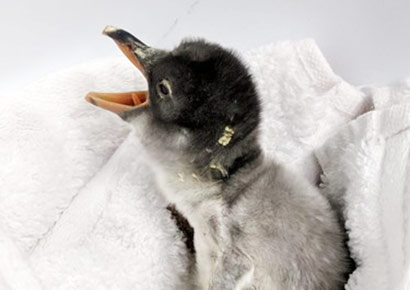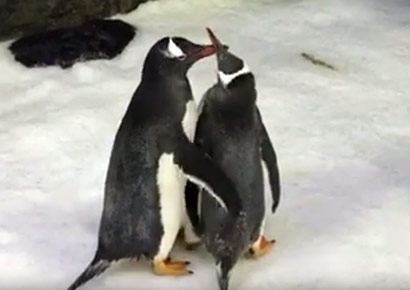Adorable! Gay penguin dads hatch a fluffy little chick

Baby Sphengic (Pic: Sydney Sea Life Aquarium)
Congratulations! Two weeks after making global headlines, gay penguin couple Sphen and Magic have brought a precious little chick into the world.
The male duo, collectively known as Sphengic, are residents at the Sydney Sea Life Aquarium and have become one of its most popular attractions.
They were given a foster egg to hatch after staff noticed that Sphen and Magic began developing a strong bond and became inseparable. The two dads were described by staff as “absolute naturals” at taking turns to incubate and guard the egg.
The aquarium has now announced that the fostered baby chick hatched on Friday 19 October.
Weighing just 91 grams, the unnamed chick has also waddled into the history books, not only as the attraction’s first chick fostered by a same-sex couple but also the first sub-Antarctic penguin chick hatched at the facility.
The proud dads are doing well and are co-parenting exceptionally well to raise their young, said the aquarium on its website.
“Baby Sphengic has already stolen our hearts! We love watching the proud parents doting and taking turns caring for their baby chick,” commented Tish Hannan, Penguin Department Supervisor at Sea Life Sydney Aquarium.
“With that said, the first 20 days of a penguin chick’s life are the most vulnerable so it is extra important the chick is very happy, healthy and well fed by his parents.”

Sphen and Magic (Pic: Sydney Sea Life Aquarium)
Hannan added: “We can’t wait for the world to fall in love with Baby Sphengic like they did with our amazing same-sex couple, Sphen and Magic!”
The chick will be named in about two weeks when its gender can be determined.
According to the aquarium, “the baby chick will act as an ambassador for its generation at Sea Life Sydney, and will help educate the public on the precious species and the plight that they face in the wild.”
Sub-Antarctic penguins face a number of threats in the wild, including loss of habitat and breeding nests due to global warming, and plastic pollution consumption which can often be passed on to their young via their unique feeding technique.
Contrary to claims that homosexuality is ‘unnatural’ by opponents of the LGBTQ community, same-sex attraction in nature is in fact not uncommon and has been documented in over 1,500 animal species.
- Facebook Messenger
- Total148
Leave a Reply